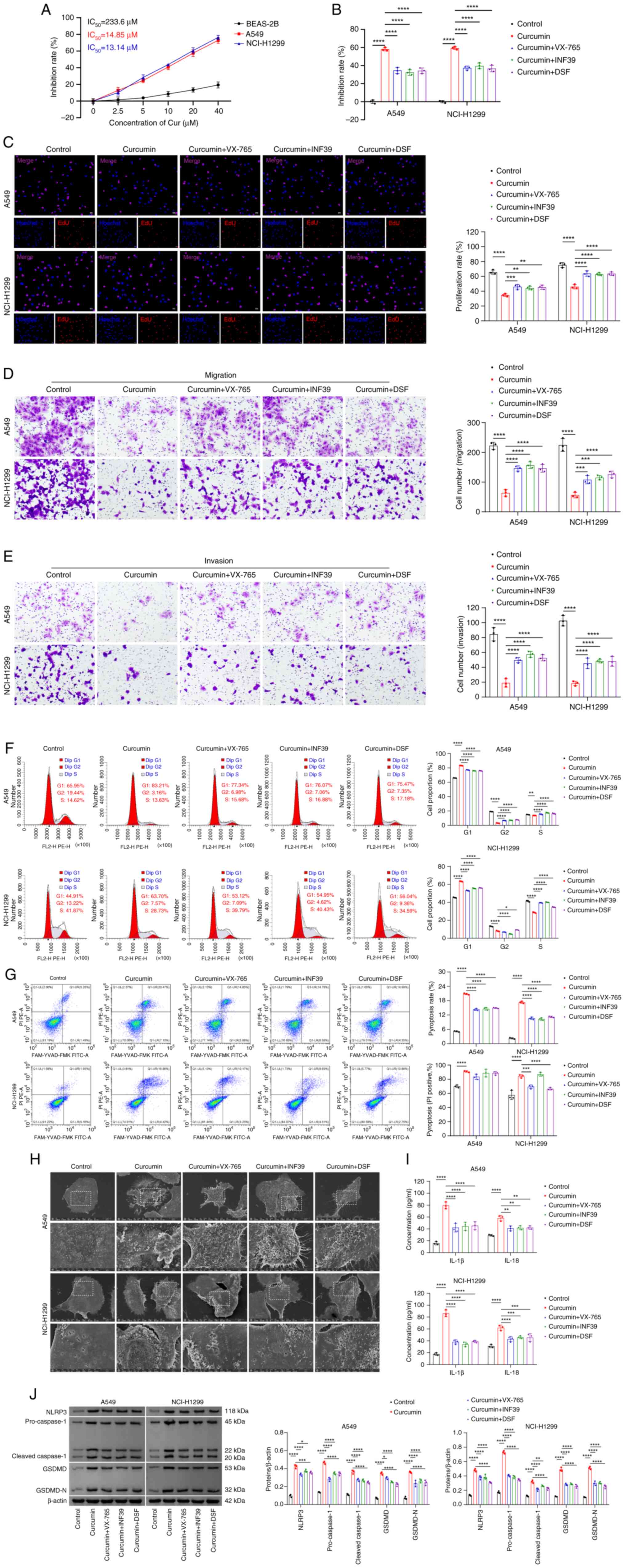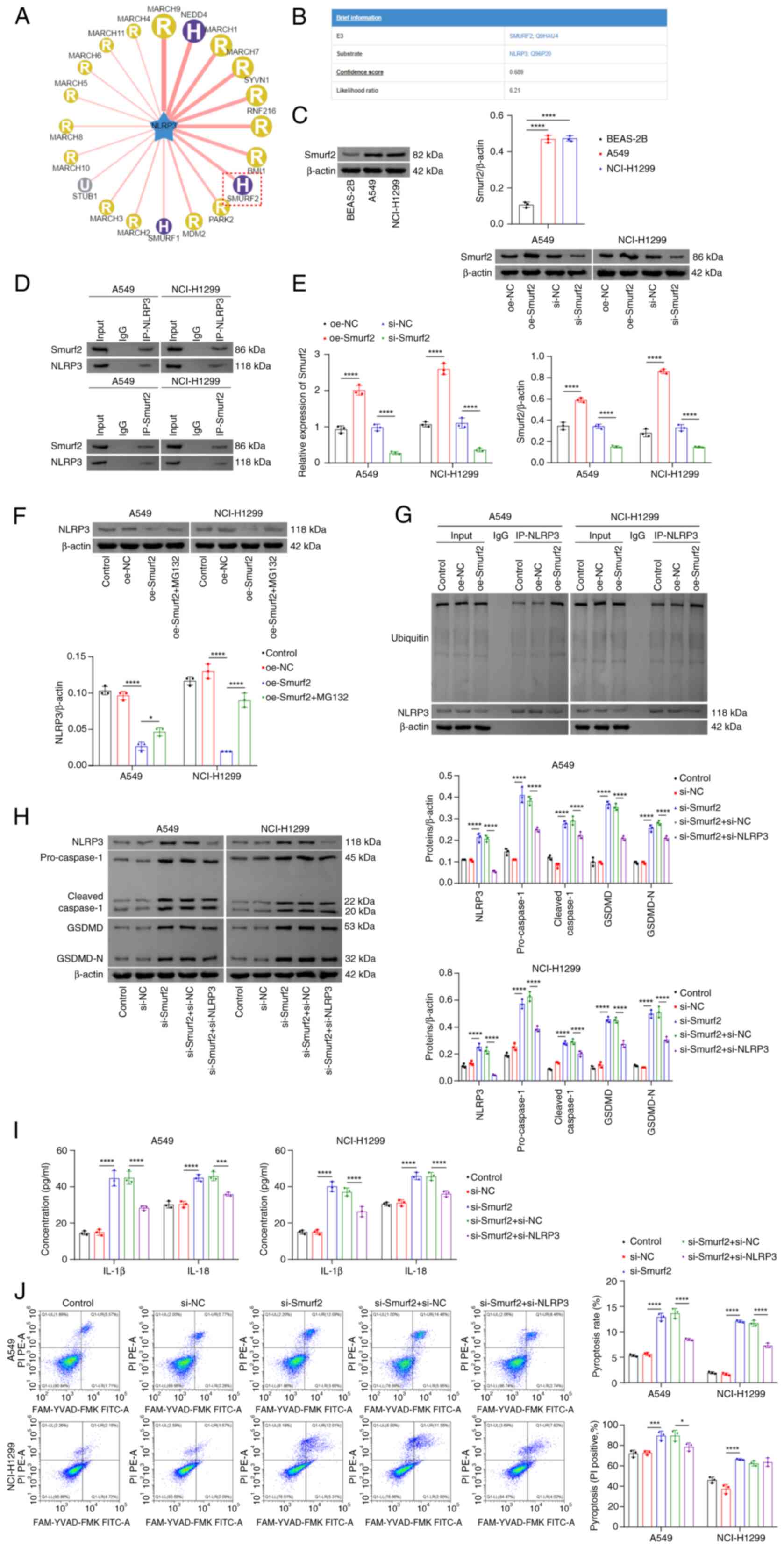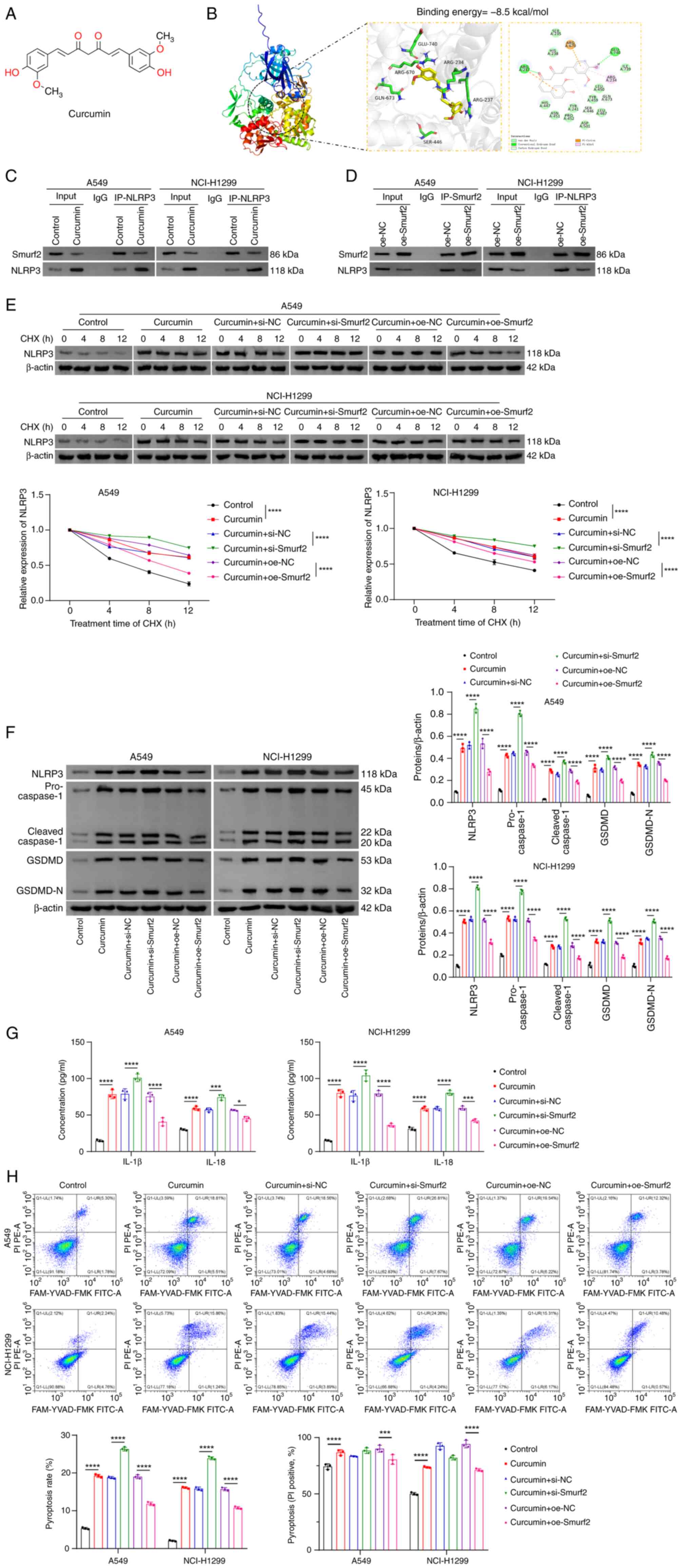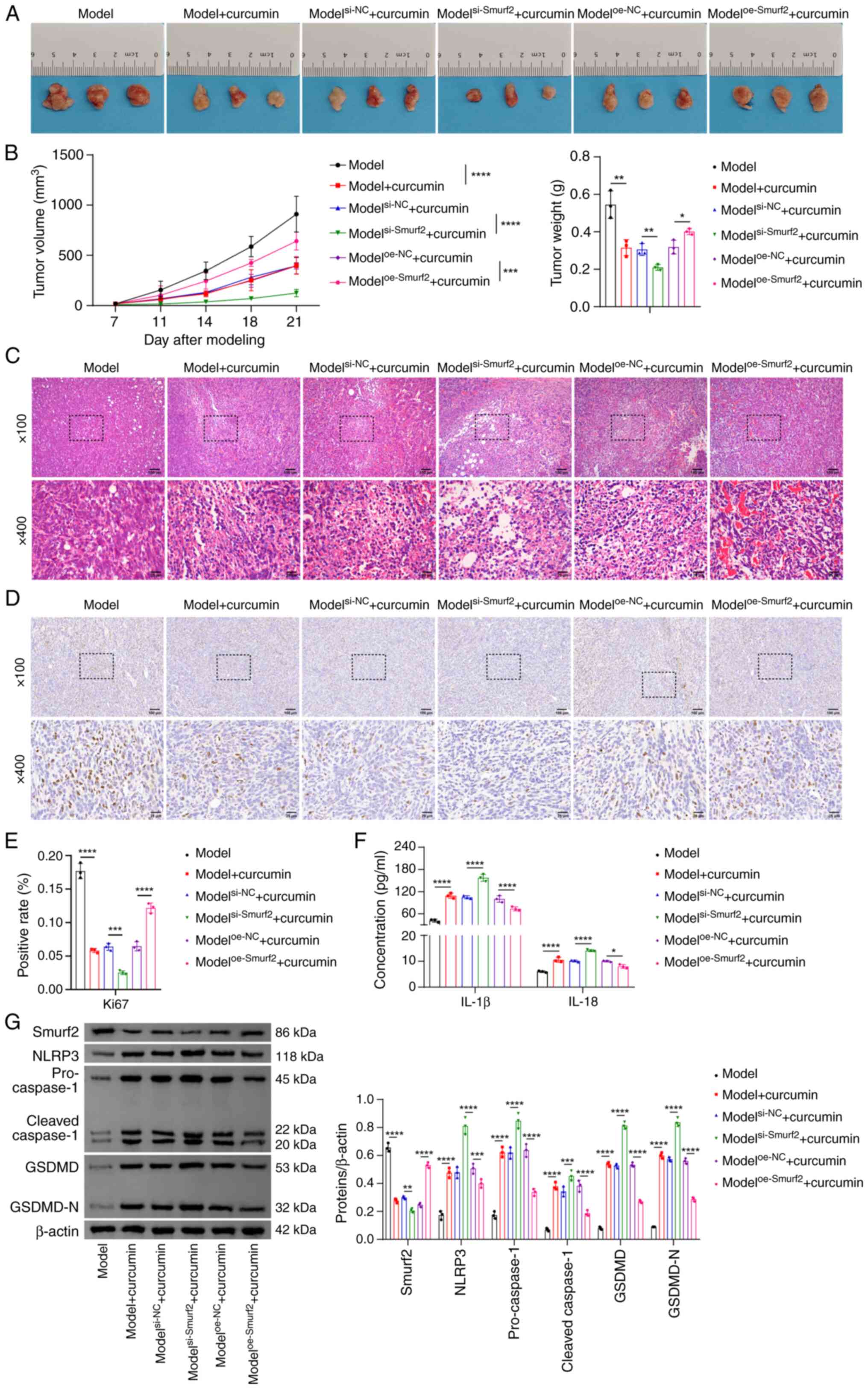|
1
|
Srivastava S, Mohanty A, Nam A, Singhal S
and Salgia R: Chemokines and NSCLC: Emerging role in prognosis,
heterogeneity, and therapeutics. Semin Cancer Biol. 86:233–246.
2022. View Article : Google Scholar : PubMed/NCBI
|
|
2
|
Ganti AK, Klein AB, Cotarla I, Seal B and
Chou E: Update of incidence, prevalence, survival, and initial
treatment in patients with non-small cell lung cancer in the US.
JAMA Oncol. 7:1824–1832. 2021. View Article : Google Scholar : PubMed/NCBI
|
|
3
|
Clark SB and Alsubait S: Non-small cell
lung cancer. StatPearls. StatPearls Publishing LLC; Treasure
Island, FL: 2024
|
|
4
|
Jonna S and Subramaniam DS: Molecular
diagnostics and targeted therapies in non-small cell lung cancer
(NSCLC): An update. Discov Med. 27:167–170. 2019.
|
|
5
|
Huang X, Wang Y, Yang W, Dong J and Li L:
Regulation of dietary polyphenols on cancer cell pyroptosis and the
tumor immune microenvironment. Front Nutr. 9:9748962022. View Article : Google Scholar : PubMed/NCBI
|
|
6
|
Kotha RR and Luthria DL: Curcumin:
Biological, pharmaceutical, nutraceutical, and analytical aspects.
Molecules. 24:29302019. View Article : Google Scholar : PubMed/NCBI
|
|
7
|
Wan Mohd Tajuddin WNB, Lajis NH, Abas F,
Othman I and Naidu R: Mechanistic understanding of curcumin's
therapeutic effects in lung cancer. Nutrients. 11:29892019.
View Article : Google Scholar : PubMed/NCBI
|
|
8
|
Fang Y, Tian S, Pan Y, Li W, Wang Q, Tang
Y, Yu T, Wu X, Shi Y, Ma P and Shu Y: Pyroptosis: A new frontier in
cancer. Biomed Pharmacother. 121:1095952020. View Article : Google Scholar
|
|
9
|
Rao Z, Zhu Y, Yang P, Chen Z, Xia Y, Qiao
C, Liu W, Deng H, Li J, Ning P and Wang Z: Pyroptosis in
inflammatory diseases and cancer. Theranostics. 12:4310–4329. 2022.
View Article : Google Scholar : PubMed/NCBI
|
|
10
|
Guo J, Yan W, Duan H, Wang D, Zhou Y, Feng
D, Zheng Y, Zhou S, Liu G and Qin X: Therapeutic effects of natural
products on liver cancer and their potential mechanisms. Nutrients.
16:16422024. View Article : Google Scholar : PubMed/NCBI
|
|
11
|
Yuan R, Zhao W, Wang QQ, He J, Han S, Gao
H, Feng Y and Yang S: Cucurbitacin B inhibits non-small cell lung
cancer in vivo and in vitro by triggering
TLR4/NLRP3/GSDMD-dependent pyroptosis. Pharmacol Res.
170:1057482021. View Article : Google Scholar : PubMed/NCBI
|
|
12
|
Duan H, Jiang L, Sun X, Liu X, Yang G, Sun
X, Cheng T, Ji Y, Zhang F, Du Y, et al: Curcumin induces MCF-7
cells pyroptosis via autophagy/CTSB/NLRP3/caspase-1/GSDMD signaling
pathway in vitro and vivo. J Vet Heal Sci. 3:250–261. 2022.
|
|
13
|
Feng SH, Zhao B, Zhan X, Li RH, Yang Q,
Wang SM and Li A: Quercetin-induced pyroptosis in colon cancer
through NEK7-mediated NLRP3 inflammasome-GSDMD signaling pathway
activation. Am J Cancer Res. 14:934–958. 2024. View Article : Google Scholar : PubMed/NCBI
|
|
14
|
Krishnan SM, Ling YH, Huuskes BM, Ferens
DM, Saini N, Chan CT, Diep H, Kett MM, Samuel CS, Kemp-Harper BK,
et al: Pharmacological inhibition of the NLRP3 inflammasome reduces
blood pressure, renal damage, and dysfunction in salt-sensitive
hypertension. Cardiovasc Res. 115:776–787. 2019. View Article : Google Scholar :
|
|
15
|
Akther M, Haque ME, Park J, Kang TB and
Lee KH: NLRP3 ubiquitination-A new approach to target NLRP3
inflammasome activation. Int J Mol Sci. 22:87802021. View Article : Google Scholar : PubMed/NCBI
|
|
16
|
Liu X, Fang Y, Lv X, Hu C, Chen G, Zhang
L, Jin B, Huang L, Luo W, Liang G and Wang Y: Deubiquitinase OTUD6A
in macrophages promotes intestinal inflammation and colitis via
deubiquitination of NLRP3. Cell Death Differ. 30:1457–1471. 2023.
View Article : Google Scholar : PubMed/NCBI
|
|
17
|
Xu T, Yu W, Fang H, Wang Z, Chi Z, Guo X,
Jiang D, Zhang K, Chen S, Li M, et al: Ubiquitination of NLRP3 by
gp78/Insig-1 restrains NLRP3 inflammasome activation. Cell Death
Differ. 29:1582–1595. 2022. View Article : Google Scholar : PubMed/NCBI
|
|
18
|
Yan B, Jin Y, Mao S, Zhang Y, Yang D, Du M
and Yin Y: Smurf2-mediated ubiquitination of FOXO4 regulates
oxygen-glucose deprivation/reperfusion-induced pyroptosis of
cortical neurons. Curr Neurovasc Res. 20:443–452. 2023. View Article : Google Scholar : PubMed/NCBI
|
|
19
|
Chaudhary KR, Kinslow CJ, Cheng H, Silva
JM, Yu J, Wang TJ, Hei TK, Halmos B and Cheng SK: Smurf2 inhibition
enhances chemotherapy and radiation sensitivity in non-small-cell
lung cancer. Sci Rep. 12:101402022. View Article : Google Scholar : PubMed/NCBI
|
|
20
|
Yang FR, Li SY, Hu XW, Li XR and Li HJ:
Identifying the antitumor effects of curcumin on lung
adenocarcinoma using comprehensive bioinformatics analysis. Drug
Des Devel Ther. 16:2365–2382. 2022. View Article : Google Scholar : PubMed/NCBI
|
|
21
|
Schamberger B and Plaetzer K:
Photofungizides based on curcumin and derivates thereof against
candida albicans and aspergillus niger. Antibiotics (Basel).
10:13152021. View Article : Google Scholar : PubMed/NCBI
|
|
22
|
Galvao J, Davis B, Tilley M, Normando E,
Duchen MR and Cordeiro MF: Unexpected low-dose toxicity of the
universal solvent DMSO. FASEB J. 28:1317–1330. 2014. View Article : Google Scholar
|
|
23
|
Li M, Wu R, Wang L, Zhu D, Liu S, Wang R,
Deng C, Zhang S, Chen M, Lu R, et al: Usenamine A triggers
NLRP3/caspase-1/GSDMD-mediated pyroptosis in lung adenocarcinoma by
targeting the DDX3X/SQSTM1 axis. Aging (Albany NY). 16:1663–1684.
2024. View Article : Google Scholar : PubMed/NCBI
|
|
24
|
Leng B, Zhang Y, Liu X, Zhang Z, Liu Y,
Wang H and Lu M: Astragaloside IV suppresses high glucose-induced
NLRP3 inflammasome activation by inhibiting TLR4/NF-κB and CaSR.
Mediators Inflamm. 2019:10824972019. View Article : Google Scholar
|
|
25
|
Zhao C, Liang F, Ye M, Wu S, Qin Y, Zhao
L, Zhang L, He J, Cen L and Lin F: GSDMD promotes neutrophil
extracellular traps via mtDNA-cGAS-STING pathway during lung
ischemia/reperfusion. Cell Death Discov. 9:3682023. View Article : Google Scholar : PubMed/NCBI
|
|
26
|
Ge X, Cai F, Shang Y, Chi F, Xiao H, Xu J,
Fu Y and Bai C: PARK2 attenuates house dust mite-induced
inflammatory reaction, pyroptosis and barrier dysfunction in
BEAS-2B cells by ubiquitinating NLRP3. Am J Transl Res. 13:326–335.
2021.PubMed/NCBI
|
|
27
|
Zhang X, Zhang K and Zhang Y: Pigment
epithelium-derived factor facilitates NLRP3 inflammasome activation
through downregulating cytidine monophosphate kinase 2: A potential
treatment strategy for missed abortion. Int J Mol Med.
45:1436–1446. 2020.PubMed/NCBI
|
|
28
|
Chen Z, Li P, Shen L and Jiang X: Heat
shock protein B7 (HSPB7) inhibits lung adenocarcinoma progression
by inhibiting glycolysis. Oncol Rep. 50:1962023. View Article : Google Scholar : PubMed/NCBI
|
|
29
|
Shih KC, Chan HW, Wu CY and Chuang HY:
Curcumin enhances the abscopal effect in mice with colorectal
cancer by acting as an immunomodulator. Pharmaceutics. 15:15192023.
View Article : Google Scholar : PubMed/NCBI
|
|
30
|
Kollias NS, Hess WJ, Johnson CL, Murphy M
and Golab G: A literature review on current practices, knowledge,
and viewpoints on pentobarbital euthanasia performed by
veterinarians and animal remains disposal in the United States. J
Am Vet Med Assoc. 261:733–738. 2023. View Article : Google Scholar : PubMed/NCBI
|
|
31
|
Cai B, Zhao J, Zhang Y, Liu Y, Ma C, Yi F,
Zheng Y, Zhang L, Chen T, Liu H, et al: USP5 attenuates NLRP3
inflammasome activation by promoting autophagic degradation of
NLRP3. Autophagy. 18:990–1004. 2022. View Article : Google Scholar :
|
|
32
|
Schmittgen TD and Livak KJ: Analyzing
real-time PCR data by the comparative C(T) method. Nat Protoc.
3:1101–1108. 2008. View Article : Google Scholar : PubMed/NCBI
|
|
33
|
Calibasi-Kocal G, Pakdemirli A, Bayrak S,
Ozupek NM, Sever T, Basbinar Y, Ellidokuz H and Yigitbasi T:
Curcumin effects on cell proliferation, angiogenesis and metastasis
in colorectal cancer. J BUON. 24:1482–1487. 2019.PubMed/NCBI
|
|
34
|
Jing X, Yun Y, Ji X, Yang E and Li P:
Pyroptosis and inflammasome-related genes-NLRP3, NLRC4 and NLRP7
polymorphisms were associated with risk of lung cancer.
Pharmgenomics Pers Med. 16:795–804. 2023.PubMed/NCBI
|
|
35
|
Menon SS, Guruvayoorappan C, Sakthivel KM
and Rasmi RR: Ki-67 protein as a tumour proliferation marker. Clin
Chim Acta. 491:39–45. 2019. View Article : Google Scholar : PubMed/NCBI
|
|
36
|
Howlader N, Forjaz G, Mooradian MJ, Meza
R, Kong CY, Cronin KA, Mariotto AB, Lowy DR and Feuer EJ: The
effect of advances in lung-cancer treatment on population
mortality. N Engl J Med. 383:640–649. 2020. View Article : Google Scholar : PubMed/NCBI
|
|
37
|
Giordano A and Tommonaro G: Curcumin and
cancer. Nutrients. 11:23762019. View Article : Google Scholar : PubMed/NCBI
|
|
38
|
Liu C, Rokavec M, Huang Z and Hermeking H:
Curcumin activates a ROS/KEAP1/NRF2/miR-34a/b/c cascade to suppress
colorectal cancer metastasis. Cell Death Differ. 30:1771–1785.
2023. View Article : Google Scholar : PubMed/NCBI
|
|
39
|
Luo T, Guan H, Liu J, Wang J and Zhang Y:
Curcumin inhibits esophageal squamous cell carcinoma progression
through down-regulating the circNRIP1/miR-532-3p/AKT pathway.
Environ Toxicol. 38:2705–2716. 2023. View Article : Google Scholar : PubMed/NCBI
|
|
40
|
Fu J and Wu H: Structural Mechanisms of
NLRP3 inflammasome assembly and activation. Annu Rev Immunol.
41:301–316. 2023. View Article : Google Scholar : PubMed/NCBI
|
|
41
|
Zheng X, Wan J and Tan G: The mechanisms
of NLRP3 inflammasome/pyroptosis activation and their role in
diabetic retinopathy. Front Immunol. 14:11511852023. View Article : Google Scholar : PubMed/NCBI
|
|
42
|
Yue E, Tuguzbaeva G, Chen X, Qin Y, Li A,
Sun X, Dong C, Liu Y, Yu Y, Zahra SM, et al: Anthocyanin is
involved in the activation of pyroptosis in oral squamous cell
carcinoma. Phytomedicine. 56:286–294. 2019. View Article : Google Scholar : PubMed/NCBI
|
|
43
|
Teng JF, Mei QB, Zhou XG, Tang Y, Xiong R,
Qiu WQ, Pan R, Law BY, Wong VK, Yu CL, et al: Polyphyllin VI
induces caspase-1-mediated pyroptosis via the induction of
ROS/NF-κB/NLRP3/GSDMD signal axis in non-small cell lung cancer.
Cancers (Basel). 12:1932020. View Article : Google Scholar
|
|
44
|
Wang X, Yin Y, Qian W, Peng C, Shen S,
Wang T and Zhao S: Citric acid of ovarian cancer metabolite induces
pyroptosis via the caspase-4/TXNIP-NLRP3-GSDMD pathway in ovarian
cancer. FASEB J. 36:e223622022. View Article : Google Scholar : PubMed/NCBI
|
|
45
|
Xie W, Peng M, Liu Y, Zhang B, Yi L and
Long Y: Simvastatin induces pyroptosis via ROS/caspase-1/GSDMD
pathway in colon cancer. Cell Commun Signal. 21:3292023. View Article : Google Scholar : PubMed/NCBI
|
|
46
|
Liu X, Li M, Chen Z, Yu Y, Shi H, Yu Y,
Wang Y, Chen R and Ge J: Mitochondrial calpain-1 activates NLRP3
inflammasome by cleaving ATP5A1 and inducing mitochondrial ROS in
CVB3-induced myocarditis. Basic Res Cardiol. 117:402022. View Article : Google Scholar : PubMed/NCBI
|
|
47
|
Chae DK, Park J, Cho M, Ban E, Jang M, Yoo
YS, Kim EE, Baik JH and Song EJ: MiR-195 and miR-497 suppress
tumorigenesis in lung cancer by inhibiting SMURF2-induced TGF-β
receptor I ubiquitination. Mol Oncol. 13:2663–2678. 2019.
View Article : Google Scholar : PubMed/NCBI
|
|
48
|
Han M, Guo Y, Li Y, Zeng Q, Zhu W and
Jiang J: SMURF2 facilitates ubiquitin-mediated degradation of ID2
to attenuate lung cancer cell proliferation. Int J Biol Sci.
19:3324–3340. 2023. View Article : Google Scholar : PubMed/NCBI
|
|
49
|
Pi Y, Feng Q, Sun F, Wang Z, Zhao Y, Chen
D, Liu Y and Lou G: Loss of SMURF2 expression enhances RACK1
stability and promotes ovarian cancer progression. Cell Death
Differ. 30:2382–2392. 2023. View Article : Google Scholar : PubMed/NCBI
|
|
50
|
Kong D, Zhang Z, Chen L, Huang W, Zhang F,
Wang L, Wang Y, Cao P and Zheng S: Curcumin blunts
epithelial-mesenchymal transition of hepatocytes to alleviate
hepatic fibrosis through regulating oxidative stress and autophagy.
Redox Biol. 36:1016002020. View Article : Google Scholar : PubMed/NCBI
|
|
51
|
Chen H, Yang R, Tang Y and Fu X: Effects
of curcumin on artery blood gas index of rats with pulmonary
fibrosis caused by paraquat poisoning and the expression of Smad 4,
Smurf 2, interleukin-4 and interferon-γ. Exp Ther Med.
17:3664–3670. 2019.PubMed/NCBI
|



















